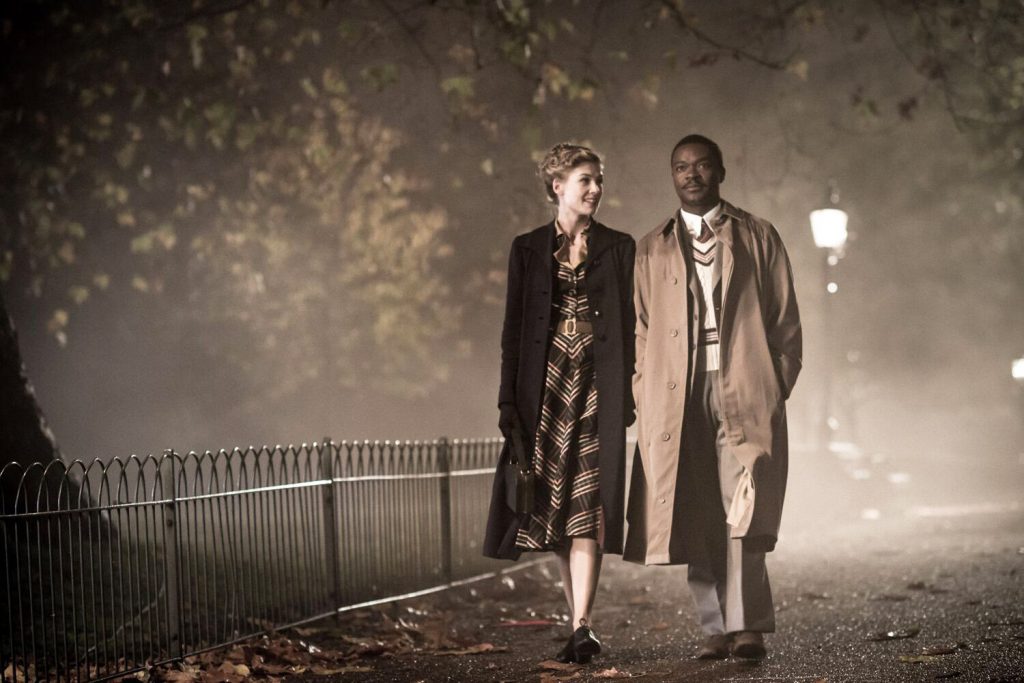(THIS ARTICLE IS MACHINE TRANSLATED by Google from Norwegian)
"Pula! Pula! 'Cries the leaders of the Bagwato tribe, kgotla. They welcomed the reigning king Seretse Khama and defied colonial power and apartheid. We are in the desert landscape of Botswana. Here is chickens the word for all good, blessing, and dark and rainy clouds. The Botswana currency is also called – "pula". This was a resounding "yes!" To the Bagwato people's new leader – even though Khama had offended the tribe by not choosing a wife from there. Instead, he had chosen to marry a white woman, Ruth Williams, whom he met while studying in London. In South Africa's neighboring countries under the apartheid regime, this was a highly controversial choice.
 The woman's position. British Amma Asante has directed A United Kingdom. Asante, raised in London's working class with Ghanaian parents, is very conscious that she is both black and female. She has chosen to focus the film on White Ruth's (Rosamund Pike) experiences, the family rejecting the couple back home in London, and the courage demanded by her on the culturally long journey to tribal life in Africa. For it is not Seretse (David Oyelowo) 's masculine, physical boxing skills that defeat adversity, but rather Ruth's wise approaches to women's social significance in Botswana: women's leadership, their relationship with breastfeeding, births and care. They are brave who not only follow their own emotions, but also their moral compass.
The woman's position. British Amma Asante has directed A United Kingdom. Asante, raised in London's working class with Ghanaian parents, is very conscious that she is both black and female. She has chosen to focus the film on White Ruth's (Rosamund Pike) experiences, the family rejecting the couple back home in London, and the courage demanded by her on the culturally long journey to tribal life in Africa. For it is not Seretse (David Oyelowo) 's masculine, physical boxing skills that defeat adversity, but rather Ruth's wise approaches to women's social significance in Botswana: women's leadership, their relationship with breastfeeding, births and care. They are brave who not only follow their own emotions, but also their moral compass.
Physically, David Oyelowo is almost a copy of the historic Seretse, and appears both athletic and intelligent. Seretse was a rugby player and boxer in British university sports. Rosamund Pike, for her part, puts convincing soul into Ruth's struggle to become "one of them" when she chooses to move to the African countryside. Pike was moved to tears by a photo of the Khama / Williams couple and said yes to playing the role before she had read the script, according to a statement to the Toronto Film Festival.
Rich background material. With Susan Williams' book Color Bar as a backdrop, Asante had a wealth of biographical material to pick from. "We had 250 movie moments we could choose from in the book," says film producer Brunsson Green. Under Asante's leadership, they have managed to pick out good moments and scenes, creating excitement without resorting to violent scenes and cheap Hollywood drama. The love story in the face of the degrading nature of racism and politics is drama enough; a drama that has so far recorded over US $ 10 million.
Colonialism provides the framework for this wonderful story.
When King Sonet Seretse was elected Botswana's first president in 1966, the country could easily become a parody of an African history of independence: leadership that is inherited, and natural resources that disappear into the corrupt gaps of nepotism. Botswana is a former British colony, with a poorly educated population, with no coastline, pressured by apartheid leaders in South Africa and with sudden access to huge diamond riches. It is the setting for the great war, disaster and poverty trap. The country could soon have followed in the tracks of countries like Congo, Nigeria and Angola, where the suffering of the people seems endless.
British author Susan Williams grew up in neighboring Zambia and knew the colonial British Britain's racism and arrogant dividend policy from his own life – albeit from the perspective of a privileged, white British. In Williams' book, colonialism itself provides the framework for this wonderful tale of how love defeated racial power and took the lead in a profitable mining industry. An atypical story for African colonial countries, but nevertheless true.
Film A United Kingdom starting in 1950 in London. Seretse and Ruth meet each other while he is studying in the city. The two quickly fall in love and get married after a year. As a result, they were not only ousted by Ruth's family, but the British government went to the drastic step of banishing them both for six years. Susan Williams has unearthed facts about Churchill's and others' lies and tricks in collaboration with the apartheid state of South Africa. That local Botswana forces eventually gained control of the diamond resources was almost a miracle. Perhaps this outcome was partly due to sheer coincidence and lucky timing – but a wise leader like Khama was undoubtedly crucial. And his fight would have been impossible without her.
Seretse and Ruth were exiled by the British government.
Historical abuse. Three years ago, author Williams visited Norwegian Norwegian Eline Egge, the widow of UN officer Bjørn Egge, who served in Africa. During their meeting, they entered imperialistic Britain. Eline asked whether the British Empire was more humane than most colonial powers. "No more humane," Williams said. "Just better at hiding their abuses."
I A United Kingdom Amma Asante and Susan Williams reveal some of these abuses. They give us a compelling portrayal of two individuals – and a continent – struggle for human dignity and self-determination. The end result is a unique and wonderful story that Africa has so rarely been able to tell.
The movie goes to the movies.


